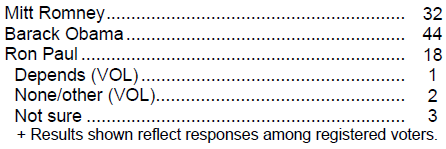According to a NBC News/Wall Street Journal survey conducted November 2-5, a third party bid by either Texas Congressman Ron Paul or New York City Mayor Michael Bloomberg could have potentially devastating consequences for the GOP in the 2012 presidential election.
In two hypothetical matchups between Mitt Romney, Barack Obama, and the aforementioned Republicans – if the 2012 presidential election were held today – the incumbent president would win reelection by a decisive margin.
Here are the results:
In short, both scenarios suggest that a third party candidacy would shift the election in favor of President Obama. While Mayor Bloomberg has expressed no desire to run, and Congressman Paul said on Fox News last Sunday that he had “no intention” of winning the presidency as a third party candidate, it’s increasingly likely the GOP will avoid a situation in which a prominent Independent or Libertarian candidate enters the race. Yet, if this were to happen – in spite of the faltering U.S. economy – President Obama would almost certainly win reelection.
Moreover, we need look no further than the 1992 and 1996 presidential elections to grasp the political clout of third party candidates. Bill Clinton, for example, never won a majority of the popular vote but was swept into office in two consecutive election cycles. In each presidential race – Ross Perot garnered 18.9% and 8.4% of the vote, respectively – the Texas businessman effectively split the Republican ticket and catapulted Clinton to victory. In other words, if a political figure as well-known and popular as Ron Paul ran on a third party platform, his influence could seriously alter the 2012 presidential election.
Recommended
More important, as Politico noted on Monday, Ron Paul did not unequivocally state he would pass up an opportunity to seek the nation’s highest political office if he loses the Republican nomination:
“I have no intention of doing that,” he said, “That doesn’t make sense to me to even think about it, let alone plan to do that.”
These words were carefully chosen, according to some pundits, and are patently ambiguous. Thus, depending on how the election plays out, he could throw his hat in the ring. After all, he will not seek another congressional term – and at the venerable age of 76 – he will likely retire from public life if he loses next year’s presidential election. What does he, in short, have to lose?
While I suspect he cares more about defeating Barack Obama in 2012 than staging an unlikely bid for the White House if and when he fails to secure the Republican nomination – the Texas Congressman has run as a third party candidate before and may very well do it again.



























Join the conversation as a VIP Member